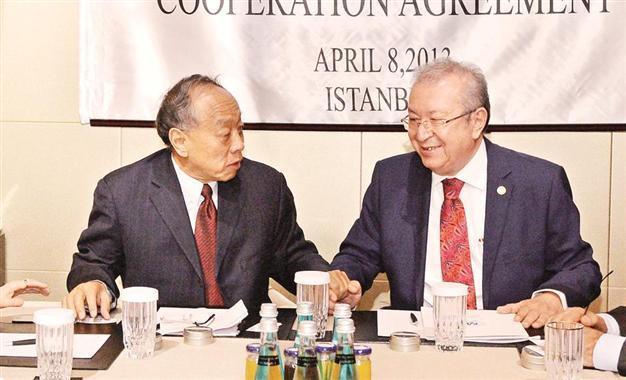Facing Japan, China eyes fair competition in Turkey’s nuclear bid
ISTANBUL - Hürriyet Daily News

DAILY NEWS photo, Emrah GÜREL
An environment of fair competition should be ensured in the bidding for Turkey’s second nuclear plant, China’s former top diplomat said April 8 during a meeting in Istanbul.
China and a Japanese-French joint venture are still competing to build Turkey’s second nuclear plant, while South Korea is out of the competition due to its problems with a treasury guarantee, Turkish Energy Minister Taner Yıldız said recently. The Turkish minister, who denied Japanese reports’ claims that the Japanese venture had won the order, said talks were continuing with Japan and China intensely, and the process was about to end.
“Both countries should compete in a fair environment,” former Foreign Minister Li Zhaoxing said, while noting the improving commercial ties between Ankara and Beijing. “We are aiming to improve the cooperation in the high-technology field between the two countries,” he said, referring to Turkey’s first Earth observation satellite, Göktürk-2, which was launched in China in December 2012. Japan, South Korea, China and Canada had been the short-listed contenders for the 5,000-megawatt nuclear power plant, which is slated to be built in the Black Sea province of Sinop. France also emerged as another bidder, with French company GDF Suez officially placing a joint bid with Japanese companies.
Last month Yıldız announced that Canada was dropping out of the competition, and South Korea has left the race as well. The second nuclear power plant is expected to require an investment worth between $22 billion and $25 billion. Russia’s Rosatom will build Turkey’s first nuclear power station, starting construction in mid-2015. The company that wins the contest for the second nuclear plant will also conduct a study on the location of a third plant that Turkey plans to build.
$100 bln goal ‘realistic’Asked whether the goal of $100 billion of trade volume between Turkey and China in 2020 was feasible, Li said the target could be reached in light of agreements made between the two countries.
Trade volume currently lies around $22.5 billion. The volume has soared from just $1 billion in 2000 to $19.5 billion in 2010. “Minor problems” between the two countries will eventually be resolved, the former top diplomat said, without elaborating further. Turkey and China have been sharply at odds on the Syrian crisis. “The number of Chinese businessmen and tourists is increasing day by day,” he said.
Commenting on the high tension in the Korean peninsula, Li said the six-party talks – grouping North Korea, South Korea, the United States, Japan, Russia and China – could find a solution to the problem.
The talks, aiming to find a peaceful resolution to security concerns resulting from the North Korean nuclear weapons program, began in 2003 but stalled in late 2008. The Korean peninsula has been locked in a cycle of escalating military tensions since the North’s third nuclear test in February, which drew toughened U.N. sanctions.
